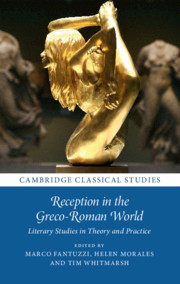Book contents
- Reception in the Greco-Roman World
- Cambridge Classical Studies
- Reception in the Greco-Roman World
- Copyright page
- Dedication
- Contents
- Figures
- Notes on Contributors
- Acknowledgements
- Abbreviations
- Altered States: Cultural Pluralism and Psychosis in Ancient Literary Receptions
- Part I Archaic and Classical Poetics
- Part II Classical Philosophy and Rhetoric, and Their Reception
- Chapter 5 On Coming after Socrates
- Chapter 6 Chimeras of Classicism in Dionysius of Halicarnassus’ Reception of the Athenian Funeral Orations
- Chapter 7 ‘Our Mind Went to the Platonic Charmides’: The Reception of Plato’s Charmides in Wilde, Cavafy, and Plutarch
- Chapter 8 Naked Apes, Featherless Chickens, and Talking Pigs: Adventures in the Platonic History of Body-hair and Other Human Attributes
- Part III Hellenistic and Roman Poetics
- Part IV Multimedia and Intercultural Receptions in the Second Sophistic and Beyond
- References
- Index
Chapter 8 - Naked Apes, Featherless Chickens, and Talking Pigs: Adventures in the Platonic History of Body-hair and Other Human Attributes
from Part II - Classical Philosophy and Rhetoric, and Their Reception
Published online by Cambridge University Press: 05 June 2021
- Reception in the Greco-Roman World
- Cambridge Classical Studies
- Reception in the Greco-Roman World
- Copyright page
- Dedication
- Contents
- Figures
- Notes on Contributors
- Acknowledgements
- Abbreviations
- Altered States: Cultural Pluralism and Psychosis in Ancient Literary Receptions
- Part I Archaic and Classical Poetics
- Part II Classical Philosophy and Rhetoric, and Their Reception
- Chapter 5 On Coming after Socrates
- Chapter 6 Chimeras of Classicism in Dionysius of Halicarnassus’ Reception of the Athenian Funeral Orations
- Chapter 7 ‘Our Mind Went to the Platonic Charmides’: The Reception of Plato’s Charmides in Wilde, Cavafy, and Plutarch
- Chapter 8 Naked Apes, Featherless Chickens, and Talking Pigs: Adventures in the Platonic History of Body-hair and Other Human Attributes
- Part III Hellenistic and Roman Poetics
- Part IV Multimedia and Intercultural Receptions in the Second Sophistic and Beyond
- References
- Index
Summary
This chapter examines the reception of two Platonic texts, the Protagoras and the Statesman, in Diogenes Laertius’ Lives of the Eminent Philosophers and Plutarch’s Gryllus. It argues that part of the reason for the success of this reception lies in the way that Plato’s texts are embedded in insolvable problems such as what constitutes nudity and how one distinguishes between animal and human. Embedding a text in a wicked problem is an effective way to ensure it afterlife. In the case of Plato, the difficulty of this problem is exacerbated by his decision to ground his distinction between animal and human in the presence or absence of body-hair. Diogenes Laertius and Plutarch, in different ways, draw attention to the simultaneous complexity, instability, and capaciousness of body-hair as a signifier. They are attracted to explore its potential, but are ultimately forced to reject it and the systems of thought that it supports as unsatisfactory.
- Type
- Chapter
- Information
- Reception in the Greco-Roman WorldLiterary Studies in Theory and Practice, pp. 194 - 216Publisher: Cambridge University PressPrint publication year: 2021
- 1
- Cited by

